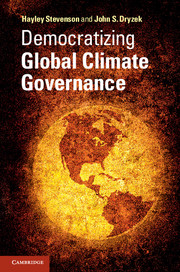Book contents
- Frontmatter
- Contents
- List of Tables
- Preface
- Acknowledgments
- List of Acronyms
- 1 The challenge of global climate governance
- 2 Global climate governance as a deliberative system
- 3 Governance with and without institutionalized authority
- 4 Authoritative global governance
- 5 Emerging centers of networked authority
- 6 Transmitting public concerns in the deliberative system
- 7 Accountability
- 8 Improving the global deliberative system
- 9 Conclusion
- References
- Index
6 - Transmitting public concerns in the deliberative system
Published online by Cambridge University Press: 05 June 2014
- Frontmatter
- Contents
- List of Tables
- Preface
- Acknowledgments
- List of Acronyms
- 1 The challenge of global climate governance
- 2 Global climate governance as a deliberative system
- 3 Governance with and without institutionalized authority
- 4 Authoritative global governance
- 5 Emerging centers of networked authority
- 6 Transmitting public concerns in the deliberative system
- 7 Accountability
- 8 Improving the global deliberative system
- 9 Conclusion
- References
- Index
Summary
Introduction
An effective deliberative system, in the global governance of climate change no less than elsewhere, requires the existence of a public space at some distance from empowered space that nevertheless enables transmission from public space to empowered space. The content of that transmission should ideally be generated in deliberatively defensible fashion in the public sphere (as analyzed in Chapter 3). The means of transmission can be deliberative – but it does not have to be. When this means is not deliberative (and even when it is), it can be scrutinized in light of whether or not it contributes to the flourishing of the deliberative system as a whole. In global climate governance we see transmission potential in the formal engagement of civil society representatives in the UNFCCC; as observers in networks; in relationships between social movements and left-wing governments; in activism at local, national, and global levels; and in the many kinds of communication with which non-governmental organizations (NGOs), businesses, scientists, activists, and journalists try to get the attention of those who seem to exercise authority. Some of these transmission mechanisms are not intrinsically deliberative but the test of their legitimacy lies in their real or potential capacity to contribute to promoting deliberation in the system as a whole, and we shall scrutinize them in such light in this chapter.
We should also be prepared to find that influence from public space to empowered space can sometimes develop very slowly over time as a result of cultural change and shifts in the balance of discourses. Constructivist scholars of international relations point to various cases of normative change that have often been achieved through the slow but persistent struggles of civil society movements. Gender and racial equality are slowly (though not yet completely) replacing institutionalized discrimination due to the efforts of feminists and anti-discrimination activists (Finnemore and Sikkink 1998: 895–6; Klotz 1999). Moral protest has succeeded in framing chemical weapons as barbaric and immoral (Price 1997); and ethical arguments contributed to delegitimizing colonialism and precipitating self-determination (Crawford 2002). In these and other cases of change, a range of participatory and contestatory measures was deployed to transmit public demands to sites of power.
- Type
- Chapter
- Information
- Democratizing Global Climate Governance , pp. 120 - 151Publisher: Cambridge University PressPrint publication year: 2014



